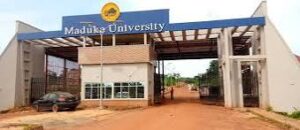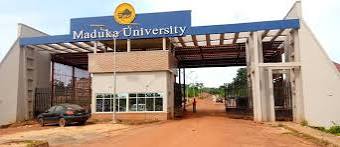The National Universities Commission (NUC) has given a resounding endorsement to Maduka University’s medical facilities, marking a significant milestone in the institution’s journey and potentially setting a new standard for medical education in Nigeria.

On Tuesday, July 16, 2024, the NUC Resource Verification Team visited Maduka University to assess its newly established Medical Sciences programs. The team, led by Prof. Bello Bala Shehu, a distinguished neuro-medicine expert with extensive experience in university and hospital administration, came away visibly impressed by the university’s infrastructure and readiness to offer programs in medicine and surgery, public health, and radiography.
Prof. Shehu’s praise for the university’s founder and chancellor, Dr. Sam Maduka Onyishi, was particularly noteworthy. He described the project as a “remarkable dream come to life,” emphasizing the potential impact of such high-quality facilities on medical education in the country.
The positive evaluation from the NUC is especially significant given Nigeria’s ongoing challenges in healthcare provision and medical education. With many public universities struggling with outdated equipment and overcrowded facilities, Maduka University’s state-of-the-art infrastructure could serve as a model for other institutions to emulate.
Dr. Onyishi, in his response to the NUC’s commendation, attributed the university’s success to divine providence. This humble approach, combined with the evident investment in world-class facilities, may resonate well with prospective students and their families who are seeking quality education within Nigeria.
The university’s rapid progress is also worth noting. As highlighted by Vice-Chancellor Prof. Charles Ogbulogo, Maduka University has made significant strides since the NUC’s initial visit in October 2023. In less than a year, the institution has not only launched 19 academic programs but also welcomed its first cohort of 611 students and celebrated its inaugural matriculation ceremony.
This swift development raises questions about the university’s strategy for maintaining quality while expanding rapidly. However, Prof. Ogbulogo’s assurance of the university’s commitment to high academic standards suggests a conscious effort to balance growth with excellence.
The introduction of medical programs at Maduka University comes at a crucial time for Nigeria’s healthcare sector. The country continues to grapple with a shortage of medical professionals, with many Nigerian doctors seeking opportunities abroad. By offering high-quality medical education domestically, Maduka University could play a role in addressing this brain drain and strengthening the local healthcare workforce.
However, challenges remain. The success of these new medical programs will depend not only on the quality of facilities but also on the caliber of faculty, the rigor of the curriculum, and the university’s ability to provide clinical experiences for its students. Moreover, the cost of maintaining such advanced facilities may raise questions about the affordability of education at Maduka University.
As Maduka University moves forward with its ambitious plans, all eyes will be on how it translates its impressive infrastructure into tangible outcomes for its students and the broader Nigerian healthcare system. The NUC’s endorsement is a promising start, but the true test will lie in the quality of graduates the university produces and their impact on Nigeria’s medical landscape.




